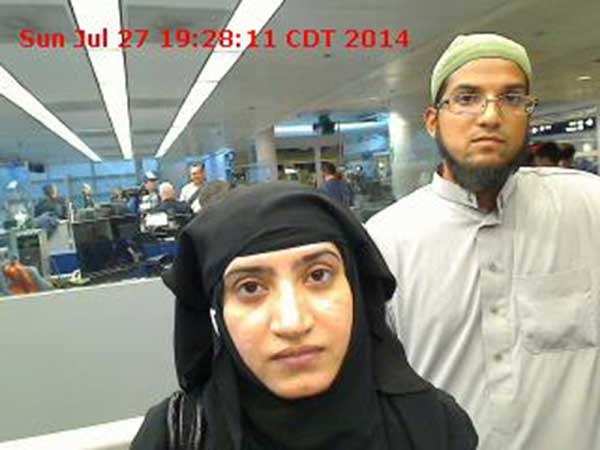California shooter messaged Facebook friends about support for jihad
Updated: 2015-12-15 10:34
(Agencies)
|
|||||||||||
 |
|
Tashfeen Malik, (L), and Syed Farook are pictured passing through Chicago's O'Hare International Airport in this July 27, 2014 handout photo obtained by Reuters December 8, 2015. [Photo/Agencies] |
Dec 14 - One of the shooters in the San Bernardino massacre, Tashfeen Malik, sent at least two private messages on Facebook to a small group of Pakistani friends in 2012 and 2014, pledging her support for Islamic jihad and saying she hoped to join the fight one day, the Los Angeles Times reported on Monday.
The messages were posted before Malik, 29, entered the United States on a K-1 fiancée visa in July 2014, the Times said, citing two top federal law enforcement officials.
Malik's messages were recovered by FBI agents investigating whether she and her husband, Syed Rizwan Farook, had been in direct contact with foreign militant organizations and were directed to carry out the Dec. 2 attack in which 14 people were killed, the Times reported.
The Times said Malik's Facebook messages indicate for the first time that US law enforcement and intelligence officials missed warnings on social media that she was a potential threat before she applied for her US visa.
The report came as US officials said that since the San Bernardino attack, the US government has begun testing new procedures for reviewing social media activity of foreigners seeking US entry visas.
The officials, who declined to be identified by name, would not discuss specific social media monitoring techniques that are being tested.
But one administration official said the new procedures should help clear up confusion about how far the Department of Homeland Security may go in monitoring the social media activity of visa applicants.
While there currently is no explicit order banning visa investigators from trawling applicants' social media accounts, some agencies have been wary about doing so, the official said.
John Cohen, former acting chief of DHS' intelligence bureau, said civil liberties and privacy concerns have given some DHS officials reservations about scrutinizing visa applicants' social media posts.
Related Stories
Southern California shooters radicalized 'for some time': FBI 2015-12-08 09:56
'We are ashamed', California shooter's estranged kin say 2015-12-08 07:48
IS says followers of the group carried out California attacks 2015-12-05 18:08
Militant links sought in California mass slaying 2015-12-05 08:05
California shooting spree 353rd mass shooting in past 336 days in US 2015-12-04 14:44
Today's Top News
Merkel pledges to reduce refugee inflow
Climate deal hailed as the right choice
Merkel refuses cap on number of refugees
China mulls court services in English
Climate talks move slowly
Fosun chairman Guo Guangchang unreachable
Putin, Cameron discuss Syria crisis, anti-terror fight
11 children drown at sea
Hot Topics
Lunar probe , China growth forecasts, Emission rules get tougher, China seen through 'colored lens', International board,
Editor's Picks

|

|

|

|

|

|






